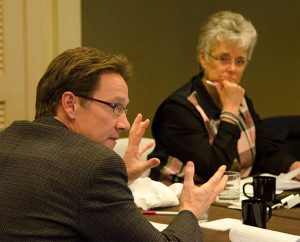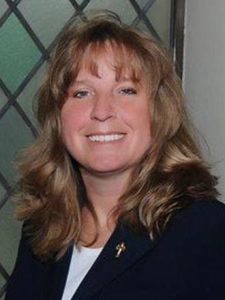By James H. Heine
ST. LOUIS — At its meeting here Jan. 30, the LCMS Task Force on Domestic Violence and Child Abuse announced plans for two district training sessions as well as a presentation at Concordia University Wisconsin’s annual Parish Nurse and Congregational Health Ministries Conference May 27-28.

The first of the district training sessions will be held April 25 during the Iowa East District Family Life Issues Conference at Zion Lutheran Church in Hiawatha, Iowa. A second training session is scheduled for the Mid-South District Pastors Conference West May 11-13 at the DeGray Resort in Bismarck, Ark.
“We are also exploring the possibility of hosting a training session at Concordia Seminary, St. Louis, this fall,” said Deaconess Kim Schave, task force chair and director of project and policy administration in the Synod’s Office of the Chief Administrative Officer.
Schave added that a presentation by task force members Rev. David Muench and Deaconess Kristin Wassilak to the LCMS Council of Presidents Nov. 17-20 in Garden Grove, Calif., was very well-received, and that additional districts have expressed an interest in hosting training sessions.
Muench is director of Ministerial Care for Concordia Plan Services. Wassilak is director of the deaconess program at Concordia University Chicago, River Forest, Ill.
“The COP was very supportive of our efforts,” Muench said.
LCMS convention mandates

The work of the task force is a response to resolutions adopted by the 2007 (Res. 6-06) and 2010 (Res. 6-06) Synod conventions. Both resolutions asked that a committee be formed to examine the issues of domestic violence and child abuse and develop materials and training to help LCMS districts, congregations and schools address the issues and minister to the spiritual needs of those affected by such abuse. The resolutions also called for the committee to make the materials and training available to seminary and professional church-worker students.
Attending the meeting in addition to Schave, Wassilak and Muench were task-force members Rev. Dr. Rick Armstrong of Lutheran Counseling Services, Winter Park, Fla.; Dr. Stephen Saunders, associate professor and director of clinical training, Klinger College of Arts and Sciences, Marquette University, Milwaukee; Dr. Bernard Tonjes, associate professor of education, Concordia University Nebraska, Seward; Karen Hardecopf, Yorkville, Ill., a parish nurse and certified lay minister; Janice Wendorf, Grafton, Wis., past president of the Lutheran Women’s Missionary League; Rev. Larry Vogel, associate executive director of the LCMS Commission on Theology and Church Relations; Rev. John Fale, associate executive director of LCMS Mercy Operations; and Sandra Ostapowich, conference executive for Higher Things, who joined the meeting via conference call.
Through conference calls, the task force also heard from Victor Vieth, executive director emeritus of the Gundersen National Child Protection Center at Winona State University, Winona, Minn., and Stephanie Wollenburg of the organization Children of Domestic Violence.
Aim for awareness, caring response
A goal of the training sessions is not to make pastors, other church-work professionals, or church lay leaders experts in the field of domestic violence and child abuse, Muench said, but to make them aware of the issues and equip them to respond with care and concern when such issues are raised, including knowing when and how to make referrals.

The task force also reviewed the materials it made available recently online here and discussed content for future Web videos and podcasts.
“We have received some really great feedback about the website,” Schave said.
In addition to the website materials, the task force also approved an insert for the March edition of Reporter. The insert, which provides posters that can be displayed in congregational facilities, helps raise awareness about the issue of domestic violence and abuse.
“We all know someone who is either currently being abused by someone else or who in the past has been abused pretty seriously,” said Saunders, even if it is not specifically known who has been abused or how they have been abused. “We might not know who they are, but we know someone. That’s how common it is.”
Because of the stigma surrounding domestic violence and child abuse, research is difficult, Saunders added. “You have to start by defining what you mean by domestic violence or domestic abuse. Or you might call it battering. You might call it spouse abuse. The different terms are defined in different ways. If you mean literally striking or physically inflecting violence on another person, those numbers are much smaller.”
If you use the broader definition of domestic abuse, which might include the violence but also includes emotional abuse — constant name-calling and insults, isolating the other person from family and friends, controlling resources and finances in the home, and, yes, spiritual abuse — the numbers are greater, Saunders said.
Results of abuse ‘shocking’
“However you define it, the results are shocking,” he added.

There is another facet, too, observed Muench and Ostapowich. Domestic abuse damages more than the adults involved in a relationship. It also affects the children — emotionally, behaviorally, socially and spiritually.
“It leads to alienation and doubt. It leads a child to ask, ‘Where is God? Why doesn’t He answer my prayers?,’ ” Muench explained.
Growing up in a home with domestic violence “changes your cognitive belief system,” Ostapowich said. “It is pernicious to children.”
Whether in our congregations or in our communities at-large, “this is not something that’s happening to a few people,” Wendorf noted. “The statistics are overwhelming. To know that when I’m sitting in worship on a weekend that there are people there with me as part of the body of Christ who have suffered unbelievable damage because of domestic violence and/or child abuse — to know that they need that Word of grace and the unfailing love and hope they can find in Christ, the better prepared I am to share the hope I have in me, because of what Jesus has done for me.”
The task-force training scheduled for May 27-28 at Concordia University Wisconsin will be helpful for parish nurses, Hardecopf said, because, often, they are among the first to become aware of abuse issues.
“As parish nurses, we have a lot of contact with people, whether it’s through blood-pressure screening, and we pull up their sleeve, and they have bruises, or we just see them in another setting, and we have a trust relationship with them. The big thing we do is refer out and make sure they have the support they need — spiritual support through the pastor and professional support through appropriate counseling.”
The opportunity to serve on this task force has confirmed for her the duty the Church has to its suffering members, and especially in the case of child abuse, those members without a voice, Schave said.
“The potential for them to walk away from the faith is too great should we provide unhelpful counsel or ignore the issue altogether,” she said.
The task force is scheduled to meet again in April via conference call.
James H. Heine (EditorialSolutions@sbcglobal.net) is a St. Louis journalist and the retired director of News and Information for LCMS Communications.
Posted Feb. 11, 2015



